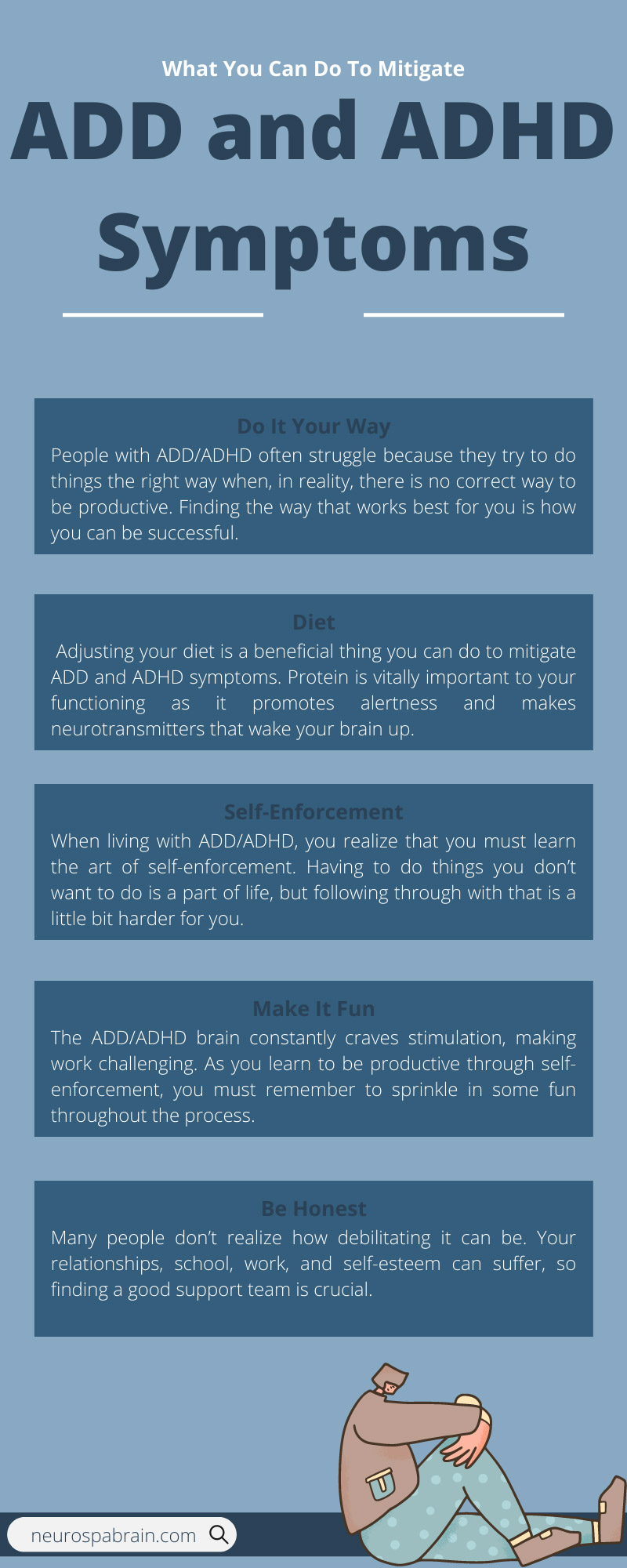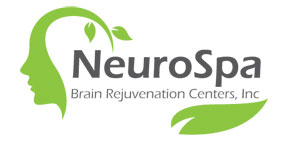
Living with ADD or ADHD isn’t easy, especially when society views it as a silly thing that people say to excuse laziness. As is the case with invisible illnesses, most people question its validity. But ADD and ADHD is real for the people living with it, and make no mistake—they are far from lazy. Many aren’t aware of how incapacitating it can be to live with ADD or ADHD, but there are ways to adapt. This is what you can do to mitigate ADD and ADHD symptoms.
Do It Your Way
People with ADD/ADHD often struggle because they try to do things the right way when, in reality, there is no correct way to be productive. Finding the way that works best for you is how you can be successful. If your biggest struggle is waking up, try to put your phone or alarm clock across the room before sleeping. Rather than rolling over and pressing snooze, you will kickstart your day and body because you must physically get up to turn it off.
Diet
As you all know, your diet plays a huge role in how you physically feel, but did you know it also has a significant effect on your brain functioning? Adjusting your diet is a beneficial thing you can do to mitigate ADD and ADHD symptoms. Protein is vitally important to your functioning as it promotes alertness and makes neurotransmitters that wake your brain up.
The best time to eat protein is in the morning, as it sets you up for the rest of your day. Moreover, try to avoid sugary foods, simple carbohydrates, and artificial dyes. Consuming these types of foods will exacerbate your symptoms.
Self-Enforcement
When living with ADD/ADHD, you realize that you must learn the art of self-enforcement. Having to do things you don’t want to do is a part of life, but following through with that is a little bit harder for you. Learning self-enforcement is especially important in adulthood, as you no longer have the outward structure of school to force you to accomplish things.
Splitting your time into increments can be useful if you’re trying to complete your work. Many successfully practice good time management with the popular Pomodoro method. This method gives you 25 minutes to work and a 5-minute break afterward, which is helpful as it gives you something to expect. You can think clearer since it’s not just work-work-work as far as the eye can see.
TMS
If you want alternatives to ADD/ADHD medication, TMS, otherwise known as Transcranial Magnetic Stimulation, could be for you. TMS is an innovative FDA-approved technology that can help treat or mitigate your symptoms through region-specific electrical stimulation of your brain. The electrical stimulation promotes blood flow, either increasing or decreasing neuron activity.
TMS may sound intense, but it’s not—there’s no radiation, no contrast, and it’s entirely non-invasive. Moreover, it considerably reduces symptoms without the long-term effects associated with ADD/ADHD medication. If you are interested and want to learn more, the NeuroSpa TMS therapy center in Orange County, California, is more than happy to assist you.
Make It Fun
All work and no play makes Jack a dull boy. It’s a creepy but true saying. The ADD/ADHD brain constantly craves stimulation, making work challenging. As you learn to be productive through self-enforcement, you must remember to sprinkle in some fun throughout the process.
Make time in your day or week for an activity you love. Set aside 15-20 minutes to play a game on your phone or whatever your preferred hobby is. You can also incentivize yourself to push through a difficult task by rewarding yourself with a bit of a treat afterward. When you dedicate some time to fun, you can return to your work calmer and more clear-headed.
Be Honest
The biggest roadblock to thriving with ADD/ADHD is the stigma behind it. Many people don’t realize how debilitating it can be. Your relationships, school, work, and self-esteem can suffer, so finding a good support team is crucial. You deserve a space where you can be honest about the struggles you’re going through.
If you’re currently in school or university, you may want to research your school’s disability services. Often, schools have disability service centers where you can receive letters of accommodations for your classes. The requirements for these letters vary, so take the time to investigate them.
Exercise
Exercise is highly beneficial for the ADD/ADHD brain. If you think about it this way, exercise is a great stimulant. Moreover, with the boundless energy you always seem to have, it’s a perfect outlet to release some of it. If you aren’t already active, you may struggle to start, but there are many different activities out there to try.
You may want to try jumping rope, skipping, tap dancing, or rollerblading. These may seem like kiddish activities, but they will help your brain whenever it’s seeking dopamine. Plus, it’s super fun, and you get a great workout in!
Got Sleep?
Sleep is essential, and as someone with ADD/ADHD, making sure you get the proper amount can be challenging. It seems like whenever you lay down to sleep, your brain starts thinking about everything and anything, but there are handy tips you can use to set yourself up for success.
The first thing you will want to do is cultivate a good sleep routine. Start by winding down about an hour before you plan to sleep. Turn off all electronics, put your phone across the room, and dim your lights as much as possible. In the meantime, try to read a book, draw, or do any calming activity that doesn’t involve a screen. That way, you will find it easier to fall asleep and get the rest you need.
Get Isolated
Sometimes you’re the most challenging roadblock when trying to accomplish anything. People with ADD/ADHD often work best when they are in a quiet place of isolation, but that can seem like the most boring place in the world. Usually, the most difficult part of this is putting yourself in that space. Try to force yourself into that work environment because your mind will be in the zone once you’re there.


